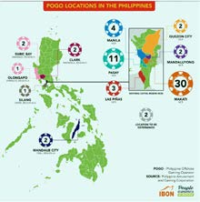n his book “The New Rules of War” Professor Sean McFate describes the post-WWII era as a period of “durable disorder.” He cites the following evidence to support his
finding: increasing challenges on the “rules-based” world order; rising number of “fragile” or “failed” states; half of the countries in the world are experiencing some form of conflict; armed conflicts today do not end but are continuing to burn without flame; rise of mercenaries and privatization of war; most of the “Fortune 500” companies are more powerful than most states; and half of peace agreements fail in 5 years. The West Philippine Sea (WPS) dispute is an example of a “durable disorder” that began way back in April 2012 but continues to test the will of the Philippine nation, and incessantly in the years to come.
The Philippines has always supported the United Nations Charter that aims for a peaceful, just and prosperous world community being one of the original signatories during its inception in June 1945. The nation has participated in numerous international peacekeeping and humanitarian efforts in conflict- laden and disaster-affected countries in Africa, Asia, and Central America. It also signed the UN Convention on the Law of the Sea (UNCLOS III) in December 1982 in spite of the reduction of its “historic waters” as provided for by the Treaty of Paris in favor of equitable sharing of the “common heritage of mankind.” Furthermore, the country dutifully followed the procedures in resolving the West Philippines Sea issue with China before the Arbitral Court as it fully subscribes to a “rules-based” international order. members of the party met CPC members Chen Min’er, Guo The recent aggressive actions of China in the WPS show the systematic application of ancient Chinese 36 stratagems used in politics, war and civil interaction believed to have been written by 6th Century Chinese general Wang Jingze. These strategems, published by the Communist Party of China in 1961, have been used extensively in crafting narratives and operational/tactical movements of China coast guard and maritime militia units. Most of these strategems are basically deceptive in nature, far from the chivalrous nature of soldiery, and intended to achieve political objectives.
The writings of famous Prussian General Carl Philipp Gottfried
Yezhou, and Wang Fu who later met then Mayor Sarah Duterte in Davao City. In December, PDP-Laban members Koko Pimentel, Dong Gonzales Jr. and Raul Lambino met in Shangrila Makati with CPC Member Wang Ning, accompanied by Chinese Ambassador Huang Xilian to “further develop their countries and improve the capacity for governance.” During the meeting, Ambassador Huang gave a thematic briefing on the Fourth Plenary Session of the Central Committee of the CPC. There was a time when some senior officials mentioned that the country could become a province of China.
At the local government level, 24 provinces and cities have Administration (NRTA), represented by NRTA Vice Minister Fan Wei Peng agreed to enhance media cooperation through an MOU and China donation of Php 180 million for radio equipment and establishment of government centers for the purpose. That many Filipinos in media and the academe now echoing Chinese narratives to abolish RP-US alliance and discredit Philippine positions aligned with the U.S. and the international law is an indication of success of such agreement and the support of many government servants, politicians and bureaucrats, who knowingly or unknowingly undermine our society and institutions.

The increase of Philippine Offshore Gaming Operators (POGO), licensed by PAGCOR starting 2016, have expanded their activities over the years. Only 17% of the nearly 150,000 employees in 2019 are Filipinos. Most employees are Chinese. Many adverse reports on POGOs, including their high vulnerability in money laundering, have come out in the papers prompting a legislator to enjoin the Anti-Money Laundering Council to investigate this gambling business and other on-line gaming and gaming schemes. The large number of mainland Chinese visiting or residing in the country, including those engaged in infrastructure labor and merchant shipping, pose challenges to the Immigration and law enforcement officials.
Apart from money laundering, which is a cybersecurity crime, crimes attributed to the POGO industry have expanded exponentially over the past several years and by end of 2023 include human trafficking, forcible abduction, homicide, illegal detention, kidnapping-for-ransom, theft, robbery-extortion, serious physical injuries, swindling, grave coercion, investment scams, cryptocurrency scams, and love scams. Data from the Philippine National Police show that from 01-January-2017 to 30- June-2023, there were 103 POGO-related crimes.
Their infiltration into our social fabric and government weakens our nationalistic fervor and corrupts our values. According to a radio commentator one Chinese averred that everything in the Philippines can be bought including land, personal protection, government agents and officials, and even justice. Such a remark does not speak well for the country.
The subversion of China cannot be taken lightly. The Chinese subversive actions reflect one of the 36 ancient strategems: Remove the fire under the cauldron. This means that in order to prevail one has to eliminate the source of your enemy’s strength. The fire (government) is the source of strength of both our people and the military under the cauldron. As Professor McFate’s 4th Rule of War states, the “hearts and minds do not matter at the tactical and operational levels” represented by the people and the military. What matters is the government, the nerve center of the state, that employs top officials who formulate policy and strategy to ensure the independence, identity, and ideals of democratic way of life of the Filipino.
The incumbent President has repeatedly declared that the government will not allow losing any square inch of WPS and, by inference, the entire archipelago. This challenge is best addressed along the lines of an old African proverb: “when there is no enemy within, the enemy outside can do you no harm.”
